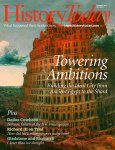Americanisation or Globalisation?
Within the next five years the United Kingdom will almost certainly be obliged to decide whether or not to abandon the pound sterling and embrace the Euro. The closer this milestone approaches, the more intense becomes the debate on the meaning of Britain’s experience in the twentieth century, the factor more than any other which is likely to decide her fate in the twenty-first.
In February 2001, Timothy Garton Ash asked ‘Is Britain European?’ He argued that Britain had long since abandoned the national perspective of a self-satisfied little island at the heart of a great empire: ‘But it is not clear whether what has replaced it is Europeanisation, Americanisation or just globalisation.’ Quite so. A leading political philosopher, John Gray, has attacked Labour’s commitment to the United States as ‘the paradigmatic modern country, which Britain should take as a model’. In contrast Jonathan Freedland, a Guardian journalist, has written an entire volume dedicated to teaching Britons how to ‘live the American dream’, first by eliminating the monarchy and then by installing a republic based on the US Constitution.
 This article is available to History Today online subscribers only. If you are a subscriber, please log in.
This article is available to History Today online subscribers only. If you are a subscriber, please log in.
Please choose one of these options to access this article:
- Purchase an online subscription
- Purchase a print and online subscription
- If you are already a print subscriber, purchase the online archive upgrade
Call our Subscriptions department on +44 (0)20 3219 7813 for more information.
If you are logged in but still cannot access the article, please contact us
If you enjoyed this article, you might like these:
- Location
- Period
- Themes
- Magazine
- Subscribe
- Archive
- Ebooks
- Reviews
- Blog
- The App
- Contact
From The Current Issue
|
Stephen Cooper
|
|
Paul Dukes
|
|
Nicholas Henshall
|


















